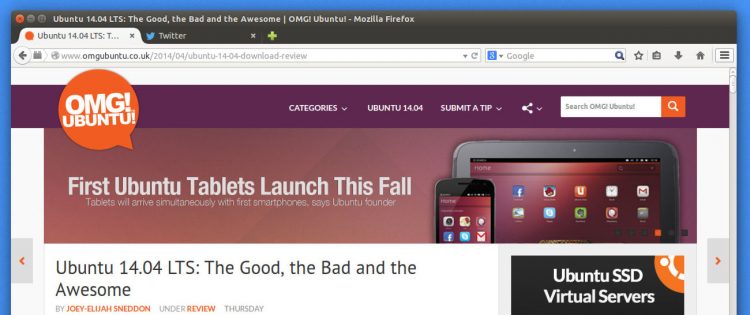Mozilla is wrestling back control of the browser from errant plugins in Firefox 30, which begins rolling out to users today, Tuesday, June 10.
After updating to the latest release users will be prompted for permission before a raft of popular plugins can run — a feature also known as ‘click-to-play‘.
Mozilla says the change is needed for them to ‘provide a better and safer experience on the Web’. It describes traditional browser plugins as a ‘legacy technology’ fast being replaced by open standards.
“Our vision is clear: a powerful and open Web that runs everywhere without the need for special purpose plugins. T[his change] will move us towards that vision, while still balancing today’s realities.”
Flash is fine
Any discussion of browser plugins will invariably see mention of arguably the most used browser bolt-on of them all: Adobe Flash. The standard Flash plugin most users have installed is not affected by this change and will remain enabled on all sites by default. Mozilla argues that the prevalence of (some may say over-reliance on) Flash content online would ‘make Flash click-to-play confusing for most users.’
The move brings the open-source browser inline with Google’s Chrome which has already phased out NPAPI plugins on Linux, and Apple’s Safari, which does disable Flash content when in ‘power saving’ mode.
When landing on a page that wants to load a blacklisted plugin a small prompt bar will appear at the top of the screen asking you to either ‘Allow’ it to run on that website, or to ‘Continue Blocking’ it.

Plugins given the okay to run do so on a per-site basis, but each plugin can be set to run automatically on all sites by adjusting the settings listed in Tools > Add-ons > Plugins.
A temporary plugin whitelist will permit 19 plugins, including Skype and Facebook Video Calling, to continue to run by default for the next four releases.
Linux Impact Lessened
While a significant step, the change will have far less of an impact on Linux users than those on Windows and Mac. This is because, for better or for worse, the majority of the third-party plugins affected are not natively available on Linux.
Other Changes
Last month the company unveiled the biggest design overhaul of the browser in over three years. That modern visual refresh, codenamed ‘Australis’, receives subtle refinements in this update. A new sidebar button allows bookmarks, history and social panes to be opened and closed quicker, there are miscellaneous padding, highlighting and colour tweaks, and an improved character encoding widget.
Elsewhere in this release Linux users will finally find support for GStreamer 1.0.
Changes in brief:
- GStreamer 1.0 support
- ‘Click to Play’ plugins
- Tweaks to Australis theme
- New developer APIs
- Sidebar button to open social, bookmark & history sidebars
For a detailed changelog see this page.
Firefox 30 Download
Firefox 30 is a free download available for Linux from the official Mozilla website. Ubuntu 12.04 LTS, 13.10 and 14.04 LTS users will automatically receive the latest release in the coming days through the Software Updater.

